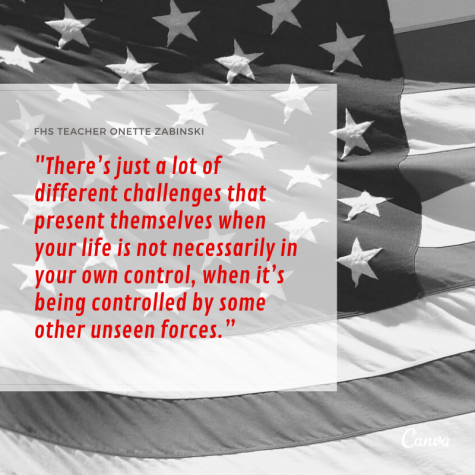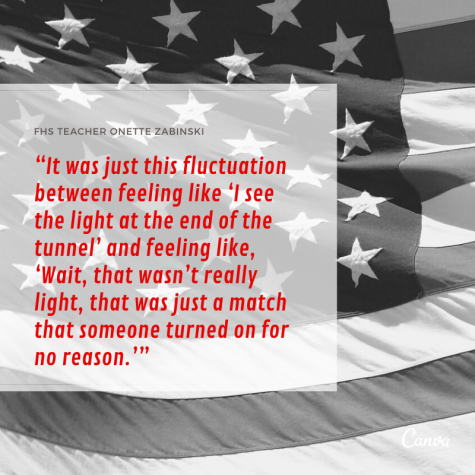Living Undocumented
February 11, 2020
“You need to pack all your things. Your notebooks, all your school stuff.”
Fremont HS English teacher Onette Zabinski vividly remembers her parents telling her this when she was 7 years old. She recalls packing her belongings into the car and thinking to herself, If we’re going on vacation, why do I have to bring all my stuff? But Zabinski didn’t ask any questions.
Her family drove 2,121 miles from Morelia, Mexico, to the Bay Area, where her mom’s sisters and extended family were already settled. Although Zabinski didn’t understand it then, she had just illegally crossed the border.
“I don’t think that my parents were ready to explain to me what was happening until we were actually here because of the sheer number of changes,” Zabinski said. “Especially the fact that I didn’t speak English and I was going to need to start school over here. All of those things were slowly rolled out once we were here in the U.S.”
Zabinski went through elementary, middle and high school as an undocumented student. For her, day-to-day life as an undocumented person was an “overwhelming stress” that compounded the diffculties of being a teenager and growing up.
“Being a high schooler on its own is a very difficult time in life; there are a lot of different stresses. To add that layer of being undocumented means that you also don’t really know [how] you’re going to navigate the world without the means to find a legal job or easily be able to access education,” Zabinski said. “There’s just a lot of different challenges that present themselves when your life is not necessarily in your own control, when it’s being controlled by some other unseen forces.” 
Without a social security number, Zabinski was unable to apply for financial aid, which made it impossible for her to attend many universities. She decided to attend De Anza College to get an affordable education and was able to cover the first year of tuition with scholarship money. After two years, Zabinski transferred to San Jose State University (SJSU). It was at SJSU that Zabinski’s future felt most hopeless. The uncertainty of her looming future and inability to work in the U.S. became such a burden that she wanted to return to Mexico.
“I told my mom that I wanted to leave,” Zabinski said. “I said, ‘I have family members in Mexico, I’m tired of feeling like I have to live in the shadows and of never being able to feel comfortable and safe outside because you just never know what’s going to happen.’ So I told her, ‘This is the idea that I have and I’m just done with this, I can’t do this anymore.’”
Zabinski’s mom’s response was simple. She told Zabinski that moving back to Mexico wasn’t just her decision — it was something that would impact both her mother and little brother.
“[My mother told me] that she was willing to have me go back [to Mexico] but only after I finished my degree,” Zabinski said. “She reminded me that education is worth an education no matter where you go. And especially if I had an American degree, then that would just open up more opportunities if and when I needed to go back.”
Zabinski remembers that period of uncertainty as a constant push and pull — her life felt manageable one second and hopeless the next.
“It was just this fluctuation between feeling like ‘I see the light at the end of the tunnel’ and feeling like, ‘Wait, that wasn’t really light, that was just a match that someone turned on for no reason,’” Zabinski said. “Just this constant swinging back and forth of feeling like what I was doing was right and […] feeling like what I was doing was fruitless.”
 Despite her fears about her hazy future, Zabinski dedicated herself to her education. When she was earning her teaching credential, her godmother texted her a link to an article that changed her life in the space of a second — the Deferred Action for Childhood Arrivals (DACA) had passed. Zabinski now had legal status in the U.S. — she could work and follow a path to citizenship.
Despite her fears about her hazy future, Zabinski dedicated herself to her education. When she was earning her teaching credential, her godmother texted her a link to an article that changed her life in the space of a second — the Deferred Action for Childhood Arrivals (DACA) had passed. Zabinski now had legal status in the U.S. — she could work and follow a path to citizenship.
“When I was finally able to go and get a driver’s license or go and get a work permit, I just couldn’t believe that it was actually real,” Zabinski said. “When I finally had all of these different documents, I started to feel just so much more like a part of actual society. I didn’t have to figure out different ways in which I needed to work around the system because now, I could work within the system.”
When DACA was rescinded in 2018, Zabinski was completely heartbroken. She herself was no longer protected under DACA at that point, but she ached for the thousands of undocumented students who wouldn’t have a chance at the life DACA had allowed her to create.
“I can’t imagine the feeling of being so close to being able to get such an opportunity and then it being pulled out from under you,” Zabinski said. “It has made me tear up on multiple occasions and it just makes me feel the same way that I felt when I was in high school and going through a lot of those feelings of uncertainty.”
